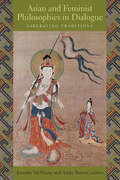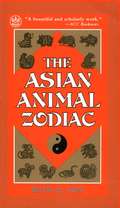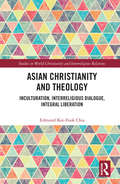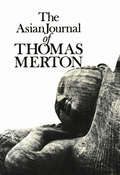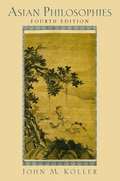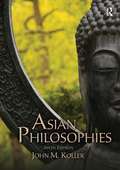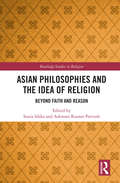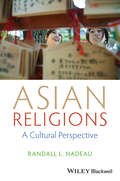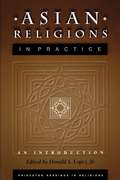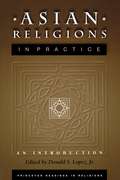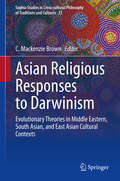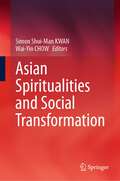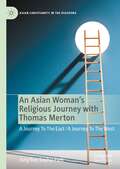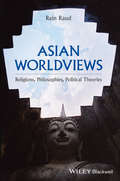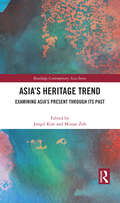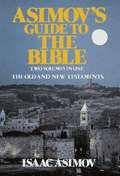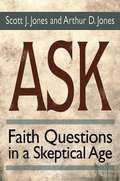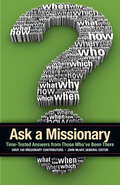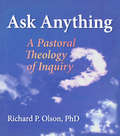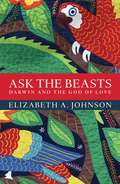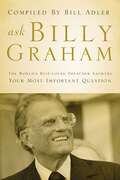- Table View
- List View
Asian and Feminist Philosophies in Dialogue: Liberating Traditions
by Jennifer McWeeny Ashby ButnorIn this collection of original essays, international scholars put Asian traditions, such as Hinduism, Buddhism, Daoism, and Confucianism, into conversation with one or more contemporary feminist philosophies, founding a new mode of inquiry that attends to diverse voices and the complex global relationships that define our world. These cross-cultural meditations focus on the liberation of persons from suffering, oppression, illusion, harmful conventions and desires, and other impediments to full personhood by deploying a methodology that traverses multiple philosophical styles, historical texts, and frames of reference. Hailing from the discipline of philosophy in addition to Asian, gender, and religious studies, the contributors offer a fresh take on the classic concerns of free will, consciousness, knowledge, objectivity, sexual difference, embodiment, selfhood, the state, morality, and hermeneutics. One of the first anthologies to embody the practice of feminist comparative philosophy, this collection creatively and effectively engages with global, cultural, and gender differences within the realms of scholarly inquiry and theory construction.
The Asian Animal Zodiac
by Norma Sun Ruth Q. SunIn much the same way that Westerners analyze their personalities and predict their futures by studying the positions of the stars under which they were born, Asians use the ancient animal zodiac to explain individual personalities and predict their futures. According to legend, the twelve years in the Asian animal cycles were named for the twelve animals who visited Buddha on his deathbed: the rat, ox, tiger, hare, dragon, snake, horse, ram, monkey, cock, dog, and boar. This informative and delightful book examines each animal of the zodiacal cycle and describes its history, its virtues and flaws, its "all-too-human characteristics." Traditional tales from China, Japan, Korea, Tibet, and Vietnam illustrate each animal's personality as the people of those nations see it.
The Asian Animal Zodiac
by Ruth Q. Sun Norma SunIn much the same way that Westerners analyze their personalities and predict their futures by studying the positions of the stars under which they were born, Asians use the ancient animal zodiac to explain individual personalities and predict their futures. According to legend, the twelve years in the Asian animal cycles were named for the twelve animals who visited Buddha on his deathbed: the rat, ox, tiger, hare, dragon, snake, horse, ram, monkey, cock, dog, and boar. This informative and delightful book examines each animal of the zodiacal cycle and describes its history, its virtues and flaws, its "all-too-human characteristics." Traditional tales from China, Japan, Korea, Tibet, and Vietnam illustrate each animal's personality as the people of those nations see it.
Asian Christianity and Theology: Inculturation, Interreligious Dialogue, Integral Liberation (Studies in World Christianity and Interreligious Relations)
by Edmund Kee-Fook ChiaThis book provides a comprehensive exploration of Asian Christianity and Theology, with emphasis on how it has developed in different parts of the continent and in the different eras, especially since the end of colonialism in Asia. Asian Theology refers to a unique way of theological reflection characterized by specific methodologies that evolved in postcolonial Asia. Premised on the thinking of Asian Church leaders and scholars, its focus is on the dialogue with the many cultures (inculturation), many religions (interreligious dialogue), and many poor (integral liberation) of Asia. The book looks at each of these ministries in detail, foregrounding Asian biblical hermeneutics, Christianity’s engagement with Hinduism, Confucianism, and Islam, Asian Women’s Theology, and the rise of Pentecostalism. The volume is valuable reading for scholars of religious studies, theology, world Christianity, Asian religions, and Asian studies.
The Asian Journal of Thomas Merton
by Thomas Merton James Laughlin Naomi Burton Stone Patrick Hart Amiya Chakravarty"This is quintessential Merton."--The Catholic Review. "The moment of takeoff was ecstatic...joy. We left the ground--I with Christian mantras and a great sense of destiny, of being at last on my true way after years of waiting and wondering..." With these words, dated October 15. 1968, the late Father Thomas Merton recorded the beginning of his fateful journey to the Orient. His travels led him from Bangkok, through India to Ceylon, and back again to Bangkok for his scheduled talk at a conference of Asian monastic orders. There he unequivocally reaffirmed his Christian vocation. His last journal entry was made on December 8, 1968, two days before his untimely, accidental death. Amply illustrated with photographs he himself took along the way and fully indexed, the book also contains a glossary of Asian religious terms, a preface by the Indian scholar Amiya Chakravarty, a foreword and postscript by Brother Patrick Hart of the Abbey of Gethsemani, as well as several appendices, among them the text of Merton's final address.
Asian Philosophies
by John M. KollerThis book offers a sympathetic examination of major Asian philosophical and religious traditions, including Vedic thought, the Jain vision, Samkhya, the Vendata, Indian theism, Islam, Buddhism, Madhyamaka, Zen, Confucianism, Taoism, Neo-Confucianism, and contemporary thought.
Asian Philosophies (6th Edition)
by John M. KollerWith an inside view from an expert in the field, solid scholarship, and a clear and engaging writing style, 'Asian Philosophies' invites students and professors to think along with the great thinkers of the Asian traditions.
Asian Philosophies and the Idea of Religion: Beyond Faith and Reason (Routledge Studies in Religion)
by Sonia Sikka Ashwani Kumar PeetushWith a focus on Asian traditions, this book examines varieties of thought and self-transformative practice that do not fit neatly on one side or another of the standard Western division between philosophy and religion. It contains chapters by experts on Buddhist, Confucian, Taoist, Hindu and Jain philosophies, as well as ancient Greek philosophy and recent contemplative and spiritual movements. The volume also problematizes the notion of a Western philosophical canon distinguished by rationality in contrast to a religious Eastern "other". These original essays creatively lay the groundwork needed to rethink dominant historical and conceptual categories from a wider perspective to arrive at a deeper, more plural and global understanding of the diverse nature of both philosophy and religion. The volume will be of keen interest to scholars and students in the Philosophy of Religion, Asian and Comparative Philosophy and Religious Studies.
Asian Religions: A Cultural Perspective
by Randall L. NadeauASIAN RELIGIONS “A unique introduction to Asian religions, combining the scholarly rigor of an established historian of Asian religions with the willingness to engage empathetically with the traditions and to suggest that readers do the same.”Joseph A. Adler, Kenyon College “Randall L. Nadeau has accomplished what only a few have tried, but which has been much needed in the study of religions. He has written a genuinely novel approach to the religions of Asia… This is a work that should find its way into Asian humanities, history, religion, and civilization courses.”Ronnie Littlejohn, Belmont University This all-embracing introduction to Asian religious practices and beliefs takes a unique approach; not only does it provide a complete overview of the basic tenets of the major Asian religions, but it also demonstrates how Asian spiritualities are lived and practiced, exploring the meaning and significance they hold for believers. In a series of engaging and lively chapters, the book explores the beliefs and practices of Confucianism, Taoism, Hinduism, Buddhism, and Japanese religions, including Shintō. Using a comparative approach, it highlights the contrasts between Asian and Western modes of thinking and living, and debates the influence of religion on real-world issues including work, economic growth, the environment, human rights, and gender relations. Nadeau, a leading figure in this field, takes an empathetic approach to Asian religious and cultural traditions, and considers Asian spiritualities to be viable systems of belief for today’s global citizens. Integrating exercises, activities, and an appealing mixture of examples, such as novels and biographies, this refreshing book leads readers to an enhanced understanding of the ideas and practice of Asian religions, and of their continuing relevance today.
Asian Religions in America: A Documentary History
by Thomas A. Tweed Stephen ProtheroArticles about Asian religions in America now and in the past.
Asian Religions In Practice: An Introduction
by Donald E. LopezPrinceton Readings in Religions is a new series of anthologies on the religions of the world, representing the significant advances that have been made in the study of religions in the last thirty years. This volume brings together the introductions to the first five volumes of this acclaimed series: Religions of India in Practice (1995), Buddhism in Practice (1995), Religions of China in Practice (1996), Religions of Tibet in Practice (1997), and Religions of Japan in Practice (1999). The introductions to these volumes have been widely praised for their accessible, clear and concise overviews of the religions of Asia, providing both historical context and insightful analysis of Hinduism, Jainism, Sikhism, Islam, Buddhism, Confucianism, Taoism, Shinto, and Bon, as well as many local traditions. The authors of the chapters are leading scholars of Asian religions: Richard Davis (India), Stephen Teiser (China), George Tanabe (Japan), and Donald Lopez (Buddhism and Tibet). They bring together the best and most current research on their topics, while series editor Donald Lopez provides an introduction to the volume as a whole. In addition to providing a wealth of detail on the history, doctrine, and practice of the religions of Asia, the five chapters offer an opportunity for sustained discussions of the category of "religion. "
Asian Religions in Practice: An Introduction (Princeton Readings in Religions #9)
by Donald S. LopezPrinceton Readings in Religions is a new series of anthologies on the religions of the world, representing the significant advances that have been made in the study of religions in the last thirty years. This volume brings together the introductions to the first five volumes of this acclaimed series: Religions of India in Practice (1995), Buddhism in Practice (1995), Religions of China in Practice (1996), Religions of Tibet in Practice (1997), and Religions of Japan in Practice (1999). The introductions to these volumes have been widely praised for their accessible, clear and concise overviews of the religions of Asia, providing both historical context and insightful analysis of Hinduism, Jainism, Sikhism, Islam, Buddhism, Confucianism, Taoism, Shinto, and Bon, as well as many local traditions. The authors of the chapters are leading scholars of Asian religions: Richard Davis (India), Stephen Teiser (China), George Tanabe (Japan), and Donald Lopez (Buddhism and Tibet). They bring together the best and most current research on their topics, while series editor Donald Lopez provides an introduction to the volume as a whole. In addition to providing a wealth of detail on the history, doctrine, and practice of the religions of Asia, the five chapters offer an opportunity for sustained discussions of the category of "religion."
Asian Religious Responses to Darwinism: Evolutionary Theories in Middle Eastern, South Asian, and East Asian Cultural Contexts (Sophia Studies in Cross-cultural Philosophy of Traditions and Cultures #33)
by C. Mackenzie BrownThis volume brings together diverse Asian religious perspectives to address critical issues in the encounter between tradition and modern western evolutionary thought. Such thought encompasses the biological theories of Charles Darwin, Jean-Baptiste Lamarck, Earnest Haeckel, Thomas Huxley, and later “neo-Darwinians,” as well as the more sociological evolutionary theories of thinkers such as Herbert Spencer, Pyotr Kropotkin, and Henri Bergson. The essays in this volume cover responses from Hindu, Jain, Buddhist (Chinese, Japanese, and Indo-Tibetan), Confucian, Daoist, and Muslim traditions. These responses come from the decades immediately after publication of The Origin of Species up to the present, with attention being paid to earlier perspectives and teachings within a tradition that have affected responses to Darwinism and western evolutionary thought in general. The book focuses on three critical issues: the struggle for survival and the moral implications read into it; genetic variation and its seeming randomness as related to the problems of meaning and purpose; and the nature of humankind and human exceptionalism. Each essay deals with one or more of the three issues within the context of a specific tradition.
Asian Spiritualities and Social Transformation
by Simon Shui-Man KWAN Wai-Yin ChowThis book offers a cross-cultural and inter-religious understanding of the ways social transformation in Asia is related to Asian spiritualities. Bringing together scholars and practitioners from different cultures and fields of study, it collates cutting-edge research and applies it to the role of Asian spiritualities in social transformation. Spirituality has garnered increasing attention in recent years across diverse fields of research and practice, from psychology and healthcare, to anthropology, education, sociology, political sciences, social work, feminist studies, cultural studies, religious studies, theology, philosophy, and so on. However, the term means different things within these different disciplines. Spirituality can be understood to be private and personal, but also public and societal, not only as a force that brings about change but also one that helps maintain the status quo – not only as a core element in religion but also as something disconnected from it. This book poses that to gain a firm grasp of spirituality, one needs to traverse these different terrains. Disbarring the orientalist understanding of spirituality that is often found embedded in stereotypes of the East as mystical, esoteric, and spiritual, in contrast to the West as scientific and rational, this book deconstructs this binarism to enable a sophisticated understanding of the diversity within Eastern and Western spiritualities. It presents “Asian spirituality” as a misnomer, focusing on the plurality of spiritualties and the region’s multifaceted religiosity, and it also excavates interfaith terrains. It is of interest to social scientists, theologians and religious scholars, and students and researchers interested in Asian spiritualties and social movements
An Asian Woman's Religious Journey with Thomas Merton: A Journey To The East / A Journey To The West (Asian Christianity in the Diaspora)
by Jung Eun ParkJoin Jung Eun Sophia Park on her personal quest for God and her true self through the writings of Thomas Merton. Approaching Merton as an Asian immigrant feminist in the postcolonial era, Park's perspective is a unique one, and in this dance sometimes it is her and sometimes Merton who leads. Throughout, Eastern and Western spirituality are organically woven together in reflection on Merton's narratives and in the examination of late capitalism, poverty, beauty, and violence. These reflections are insightful, provocative, and illuminating, particularly with regard to his androcentric spirituality, especially as it relates to his relationships with women.
Asian Worldviews: Religions, Philosophies, Political Theories
by Rein RaudAn ambitious comparative introduction to Asian thought, expertly written for undergraduate courses in Asian Studies, Asian philosophy and neighboring disciplines Recent decades have witnessed a sharp increase of interest in the cultures and regions of South and East Asia, owing in part to the prominent role Asian economies have played in the era of globalization. Asian Worldviews: Religions, Philosophies, Political Theories is a unique, reader-friendly introduction to the intellectual heritage of the region. Assuming no previous background in Asian cultural history, Asian Worldviews moves beyond chronological and geographic boundaries to present an integrated treatment of the beliefs, teachings, and ideologies that have shaped the worldviews of approximately half of the global population. Rein Raud explores forms of knowledge in China, India, Tibet, Japan, Korea, and Southeast Asia, providing balanced coverage of all historical periods from antiquity to the modern day. Asian Worldviews embraces the connections rather than the divisions between the religious and philosophical dimensions of South and East Asian thought, and emphasizes a robust engagement with each culture's political, social, and economic contexts. Clear, accessible chapters discuss the development of religious, philosophical, and political thought in India, China, and Japan, and provide succinct overviews of the history of ideas in Korea, Tibet, and Southeast Asia. Throughout the book, Raud uses a comparative approach to examine the mutual influence and productive dialogue, past and present, between Asian cultures as well as with the West, and considers the impact of various worldviews on the development of modern Asian societies. Comprehensive and well-informed by recent developments in the scholarship, Asian Worldviews: Religions, Philosophies, Political Theories is an unparalleled resource for a broad range of courses in Asian studies, philosophy, religious studies, and global politics, as well as an excellent introduction for non-specialist readers looking for a contextual foothold in the rich cultural and intellectual history of South and East Asia.
Asia’s Heritage Trend: Examining Asia’s Present through Its Past (Routledge Contemporary Asia Series)
by Jongil Kim Minjae ZoeKim and Zoh bring together a team of contributors to analyse the role of heritage studies across Asia, and its impact on Asia and its constituent countries. Is there such a thing as ‘Asian heritage’? Is it more helpful to understand Asia as a single unit, or as a set of sub- regions? What can we learn about Asia’s present through its archaeology and heritage? Covering a wide range of countries, including Afghanistan, Cambodia, China, Korea, Laos, Myanmar, Japan, Taiwan, Thailand and Vietnam, the contributors to this book address these key questions. In doing so they look at a number of critical issues, such as UNESCO World Heritage status, cultural propaganda, cultural erasure and difficult heritage. While addressing Asia’s past they also observe key issues within present- day Asia, further providing conceptual and practical insights into the methods that are being applied to the study of Asia’s heritage today. A valuable resource for scholars and students of Asian history and culture, archaeology, heritage studies, anthropology and religious studies.
Asimov's Guide to the Bible: The Old and New Testaments
by Isaac AsimovFrom the Publisher: Asimov's Guide to the Bible: The Old and New Testaments (2 Volumes in 1) clarifies such topics as the real nature of the Flood and the parting of the Red Sea, the significance of Cain and Abel, the Gospels' position on slavery, the astronomical explanation of the Star of Bethlehem (Halley's Comet), and more. From the book: This encyclopedic edition brings an important fund of knowledge to any reader of the Bible. Illuminating events of the Old and New Testaments by informing us of the actual historical, geographical and biographical aspects of the time, this is as provocative and entertaining as it is informative.
Ask: Faith Questions in a Skeptical Age (Ask)
by Scott J. Jones Arthur D. JonesWe live in a skeptical age. People--especially young people--express doubts about Christian faith. In this thoughtful eight week study Bishop Scott Jones, author of The Wesleyan Way, partners with his son Rev. Arthur Jones, to address hard questions that all of us face when considering faith, religion, and the church. The questions include: Can only one religion be true? Why is there suffering and evil? How can I believe in science and creation? How can I believe in a God I can't prove? Can I trust the Old Testament? Are marriage, sex, and family life religious issues? Was Jesus' resurrection real? Why do Christians disagree about so many things? The message is strong and clear: Don't let your questions stop you from accepting God's invitation to faith. Engage your doubt, and you may find you are closer to God on the other side.
Ask a Missionary: Time-Tested Answers from Those Who've Been There Before
by John McVayAsk a Missionary
Ask Anything: A Pastoral Theology of Inquiry
by Richard L Dayringer Richard P OlsonKnow how to answer those most-asked questions-by using a scriptural perspectiveThe search for answers remains a valuable catalyst for the growth of personal faith. Ask Anything: A Pastoral Theology of Inquiry provides a fresh approach to answering questions of personal growth, facing problems, and building community. The questions most asked of today&’s pastors and pastoral counselors are answered by integrating psychological with biblical/Christian perspectives. Jesus&’ own questions from scripture are presented as a response to those difficult questions, sparking a self-reflective personal dialogue that illuminates as well as inspires. As each of us journeys through life, urgent questions arise even for the most faithful. Each chapter of Ask Anything: A Pastoral Theology of Inquiry takes parishioners' most-asked questions about the basic issues of life, death, and faith, and connects them with Jesus' questions from scripture, allowing a new depth of introspection and thought. These questions open a free flow of ideas that refreshes personal perspectives and leads to a spiritual resolution for the issue at hand. Jesus' teachings spring to life through the questions from the gospels and the probing thoughts of contemporary authors and scholars, stimulating a productive inner dialogue and positive direction for reflection. Each chapter is carefully referenced and includes helpful exercises and questions for group discussion, counseling conversations, or personal contemplation. Appendixes are included with complete listings of Jesus' questions from the gospels as well as a complete bibliography to facilitate further research.Ask Anything: A Pastoral Theology of Inquiry discusses these questions often asked of pastors: Where do I find meaning in life? How can I succeed? What can I do to protect my children? How can I know which leaders to trust? What can I do about my battle with depression? What can I do about my burnout and fatigue? How can I know God loves me? What is prayer? What happens when I pray? Why is my prayer unanswered? Why is there suffering? Where do I find hope? What happens when I die? What can I do about the pain of grief?Ask Anything: A Pastoral Theology of Inquiry is inspiring, eye-opening reading perfect for pastoral and other Christian counselors, ministers with responsibility for preaching, and any layperson hoping to gather greater insight into Jesus&’ personal answers to their own questions.
Ask The Beasts: Darwin and the God of Love
by Elizabeth A. JohnsonFor millennia plant and animal species have received little sustained attention as subjects of Christian theology and ethics in their own right. Focused on the human dilemma of sin and redemptive grace, theology has considered the doctrine of creation to be mainly an overture to the main drama of human being`s relationship to God. What value does the natural world have within the framework of religious belief? The crisis of biodiversity in our day, when species are going extinct at more than 1,000 times the natural rate, renders this question acutely important. Standard perspectives need to be realigned; theology needs to look out of the window, so to speak as well as in the mirror. Ask the Beasts: Darwin and the God of Love leads to the conclusion that love of the natural world is an intrinsic element of faith in God and that far from being an add-on, ecological care is at the center of moral life.
Ask Bethany
by Bethany HamiltonHonest, sometimes gut-wrenching questions from Bethany Hamilton's fan mail---paired with inspirational Bible verses and Bethany's own answers---will keep girls ages eight to twelve turning the pages of this book.
Ask Bethany, Updated Edition
by Bethany Hamilton Doris Wynbeek RikkersFrom Bethany Hamilton’s fan letters come these honest, sometimes gut-wrenching questions. Some questions you may have asked about yourself at some time. Bethany’s sincere answers reflect her faith, and with some of her favorite Scripture versus, her answers will inspire you, let you into Bethany’s heart, and possibly help you with some of your own life questions.This updated edition includes some new questions and answers, and lets readers see how she has grown and changed, and where she is today.
Ask Billy Graham: The World's Best-Loved Preacher Answers Your Most Important Questions
by Bill AdlerWould you like to know what Billy Graham thinks about the most important issues of daily life? What about politics, presidents and terrorism? This book contains answers to questions many of us would ask Billy Graham if we had the good fortune to sit down with the person many call "America's Pastor". Best-selling author Bill Adler arranges topics from Graham's sermons, speeches, interviews, television appearances and writings in an easy to follow Q and A format. Topics include Billy Graham on: Humor, Politics, Prayer, Technology and Religion, Race, Money, the Church, and Growing Older. Hear Graham's responses to questions likeWhat will heaven be like?Why does God bring on natural disasters?What do you think about the mixing of religion and politics?What do you say to an atheist who doesn't think there is a God?What is the greatest spiritual threat facing the United States?How can we achieve world peace?
